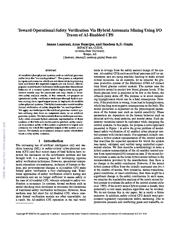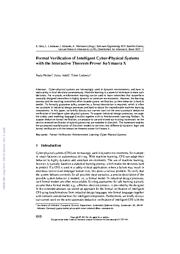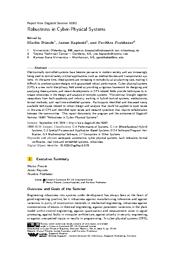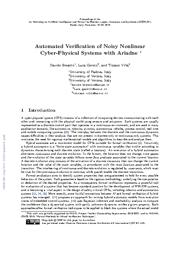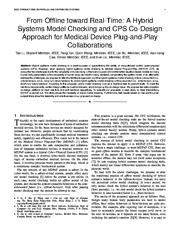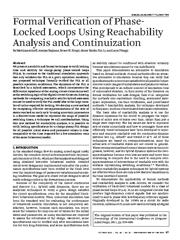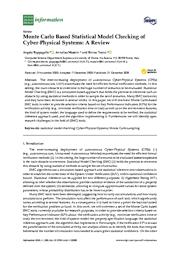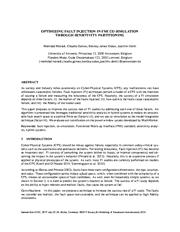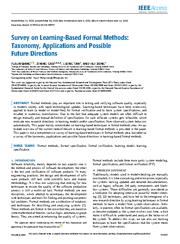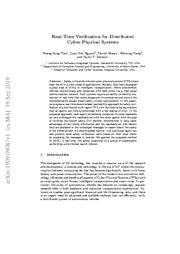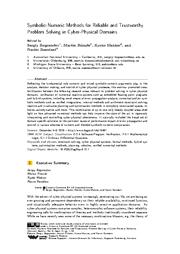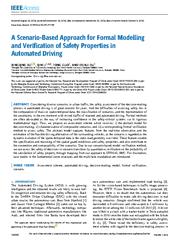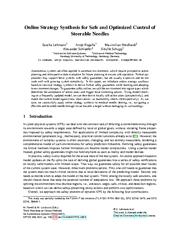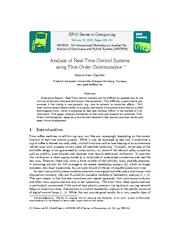A copy of this work was available on the public web and has been preserved in the Wayback Machine. The capture dates from 2022; you can also visit the original URL.
The file type is application/pdf.
Filters
Toward Operational Safety Verification Via Hybrid Automata Mining Using I/O Traces of AI-Enabled CPS
2020
AAAI Conference on Artificial Intelligence
The hybrid automaton model enables formal verification of safety despite the "no oracle problem". ...
Hence, popular model-based verification techniques that characterize behavior of a control system before deployment using predictive models may be inaccurate and may result in incorrect safety analysis ...
The proposed scheme is based on hybrid automaton mining using real-time data collected from the operation of an AI-enabled CPS in the field. ...
dblp:conf/aaai/LamraniBG20
fatcat:wzd5v7zh6jb2llgcpkutrhc5cq
Formal Verification of Intelligent Cyber-Physical Systems with the Interactive Theorem Prover KeYmaera X
2021
Software Engineering
To support deductive formal verification, we propose to use and extend our existing framework for the service-oriented verification of hybrid systems that are modeled in Simulink. ...
In this paper, we briefly discuss our current work on the semi-automatic deductive verification of intelligent cyber-physical systems. ...
Verification of Intelligent CPS with KeYmaera X To put our general approach into practice, we are currently working on a contract-based verification approach for intelligent CPS that are modeled with Simulink ...
dblp:conf/se/HerberAL21
fatcat:jparfx5ywbe73pbzzgwlcvcbvy
Robustness in Cyber-Physical Systems (Dagstuhl Seminar 16362)
2017
Dagstuhl Reports
This seminar brought together researchers from both academia and industry working in hybrid control systems, mechatronics, formal methods, and real-time embedded systems. ...
Participants identified and discussed newly available techniques related to robust design and analysis that could be applied to open issues in the area of CPS and identified open issues and research questions ...
Each new source of uncertainty or disturbance further complicates the model and therefore requires a systematic but none-the-less time-intensive re-verification. ...
doi:10.4230/dagrep.6.9.29
dblp:journals/dagstuhl-reports/FranzleKP16
fatcat:uiivaekedzdqdpmn2shsecrpve
Automated Verification of Noisy Nonlinear Cyber-Physical Systems with Ariadne
2019
International Conference of the Italian Association for Artificial Intelligence
An execution of a hybrid automaton alternates continuous and discrete evolution. ...
verification of hybrid automata. ...
dblp:conf/aiia/BresolinGV19
fatcat:qr7u5gsdcbgdjlekqfjrt45euu
From Offline toward Real-Time: A Hybrid Systems Model Checking and CPS Co-design Approach for Medical Device Plug-and-Play (MDPnP)
2012
2012 IEEE/ACM Third International Conference on Cyber-Physical Systems
The study shows the necessity of online model checking. Furthermore, test results based on real-world human subject trace show the feasibility and effectiveness of our proposed co-design. ...
Hybrid systems model checking is a great success in guaranteeing the safety of computerized control cyber-physical systems (CPS). ...
The tool is based on UPPAAL engine and models real-time systems as timed automata, whereas our online model checking of MDPnP systems focuses on more general hybrid systems. ...
doi:10.1109/iccps.2012.10
dblp:conf/iccps/LiTWBCL12
fatcat:fpwc3gpohbfcvjqeqry6fcmgh4
Formal verification of phase-locked loops using reachability analysis and continuization
2013
Communications of the ACM
We develop a new method for computing effective overapproximations of the sets of states reached on each cycle by using uncertain parameters in a discrete-time model to represent the range of possible ...
the time required for a few simulation runs of the same behavioral model. ...
Acknowledgments The authors acknowledge the support of the NSF Award CCF0926181 and the C2S2 Focus Center, one of six research © 2013 aCm 0001-0782/13/10 $15.00 ...
doi:10.1145/2507771.2507783
fatcat:updtbl7skrcsfpinygijcz7avi
Formal verification of phase-locked loops using reachability analysis and continuization
2011
2011 IEEE/ACM International Conference on Computer-Aided Design (ICCAD)
We develop a new method for computing effective overapproximations of the sets of states reached on each cycle by using uncertain parameters in a discrete-time model to represent the range of possible ...
the time required for a few simulation runs of the same behavioral model. ...
Acknowledgments The authors acknowledge the support of the NSF Award CCF0926181 and the C2S2 Focus Center, one of six research © 2013 aCm 0001-0782/13/10 $15.00 ...
doi:10.1109/iccad.2011.6105400
dblp:conf/iccad/AlthoffYRLKP11
fatcat:pm5bsaiqozdchboc7jxbgicszy
Monte Carlo Based Statistical Model Checking of Cyber-Physical Systems: A Review
2020
Information
time or cost) as well as on the environment features, the kind of system model, the language used to define the requirements to be verified, the statistical inference approach used, and the algorithm implementing ...
In this paper, we will overview Monte Carlo-based SMC tools in order to provide selection criteria based on Key Performance Indicators (KPIs) for the verification activity (e.g., minimize verification ...
Acknowledgments: We thank Alberto Lluch Lafuente for his very useful remarks on a preliminary version of this paper.
Conflicts of Interest: The authors declare no conflict of interest. ...
doi:10.3390/info11120588
fatcat:fur5l4427ff4zkbdxyqtfuk2fq
Optimizing fault injection in FMI co-simulation through sensitivity partitioning
2020
Figshare
Fault Injection (FI) techniques perturb a model of a CPS with the intention of causing a failure and measuring the robustness of the CPS. ...
Naturally, the success of a FI simulation depends on three factors: (i) the realism of the faults injected; (ii) how quickly the faults cause catastrophic failure; and (iii) the fidelity of the model used ...
ACKNOWLEDGEMENTS This work is partly supported by INES (Innovation in the Development of Electrical Systems For Aeronautics) under project no. 11172. ...
doi:10.6084/m9.figshare.12479936
fatcat:syiyjcertjesdksuhalwdihzea
Survey on learning-based formal methods: Taxonomy, Applications and Possible future directions
2020
IEEE Access
Learning-based techniques have been extensively applied to learn (a model or model-free) for formal verification and to learn system specifications, and resulted in numerous contributions. ...
This paper mainly concentrates on learning-based techniques in formal methods area. An upto-date overview of the current state-of-the-art in learning-based formal methods is provided in the paper. ...
ACKNOWLEDGMENT The authors would like to thank the anonymous referees for their comments that helped to substantially improve the quality of the article. ...
doi:10.1109/access.2020.3000907
fatcat:uiy7d2ellrc4jmzn4eumleeoy4
Real-Time Verification for Distributed Cyber-Physical Systems
[article]
2019
arXiv
pre-print
Any particular agent can also perform local safety verification tasks based on their local clocks by analyzing the messages it receives. ...
In this paper, we propose a real-time decentralized reachability approach for safety verification of a distributed multi-agent CPS with the underlying assumption that all agents are time-synchronized with ...
Acknowledgments The material presented in this paper is based upon work supported by the Air Force Office of Scientific Research (AFOSR) through contract number FA9550-18-1-0122 and the Defense Advanced ...
arXiv:1909.09087v1
fatcat:hcljqfyhcffslbrey3wlzb72ii
Symbolic-Numeric Methods for Problem Solving in CPS (Dagstuhl Seminar 16491)
2017
Dagstuhl Reports
the following research areas relevant to problem solving in cyber-physical domains: verification of numerical reactive systems such as embedded floating-point programs and hybrid systems, including novel ...
This combination of up to now only loosely coupled areas shed light on how advanced numerical methods can help improve the state of the art in rigorously interpreting and controlling cyber-physical phenomena ...
We use Stochastic timed logic (STL) to rigorously define the notion of survivability and evaluate STL formulas using model checking techniques e.g. on Hybrid Petri nets. ...
doi:10.4230/dagrep.6.12.1
dblp:journals/dagstuhl-reports/BogomolovFMR16
fatcat:sydj4slvefa7boehai7gpnfupm
A Scenario-based Approach for Formal Modelling and Verification of Safety Properties in Automated Driving
2019
IEEE Access
Due to our scenario-based model verification method, we can assess the safety of decisions in scenario transitions by quantitative verification on the probability of the satisfaction of safety property ...
The abstract model captures features from the real-time observation and the estimation of the feasible driving alternatives of the surrounding vehicles, as the scenario is regarded as the dynamic evolution ...
MoDeST toolset is ideal for modelling and verification of Stochastic Timed Automaton (STA) [34] and SHA [35] . ...
doi:10.1109/access.2019.2943184
fatcat:wzmnumn3qjgs5fbx3r37zj6ymm
Online Strategy Synthesis for Safe and Optimized Control of Steerable Needles
2021
Electronic Proceedings in Theoretical Computer Science
Using model checking on a frequently updated model, we can then derive locally safe action plans (prospectively), and match the current model against new observations via reachability checks (retrospectively ...
In this paper, we introduce online strategy synthesis based on classical strategy synthesis to derive formal safety guarantees while reacting and adapting to environment changes. ...
An online approach based on model updates on the fly splits the task of deriving global guarantees into a series of safety verifications on locally valid models with limited scope. ...
doi:10.4204/eptcs.348.9
fatcat:hg3j7xr3fje6hmyxztisthaazm
Analysis of Real-Time Control Systems using First-Order Continuization
2020
International Workshop on Applied Verification of Continuous and Hybrid Systems
This paper uncovers limitations of that work and presents an extension, First-Order Continuization, based on a new formal framework that recovers previous results and eases future development. * Acknowledgement ...
Experience Report: Real-Time control systems can be difficult to analyze due to the mixture of discrete-time and continuous-time dynamics. ...
In summary, First-Order Continuization and the underlying formal framework are a promising step towards the verification of real-time control systems with uncertain timing. a transition function trans ...
doi:10.29007/8nq6
dblp:conf/arch/Gaukler20
fatcat:kec7pakyxjbmfk5qhrwodojwom
« Previous
Showing results 1 — 15 out of 163 results

